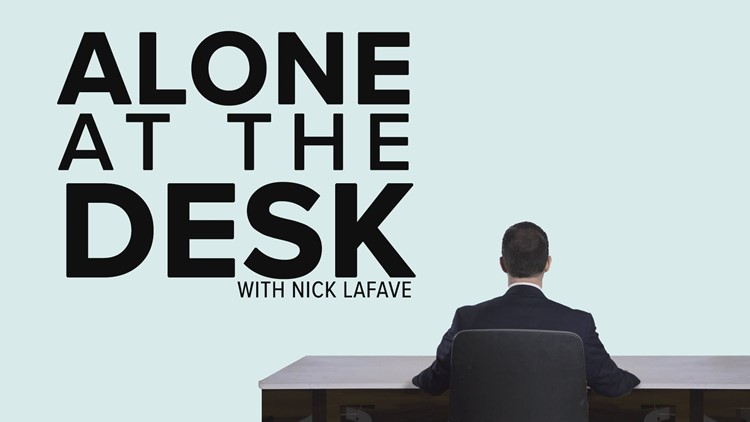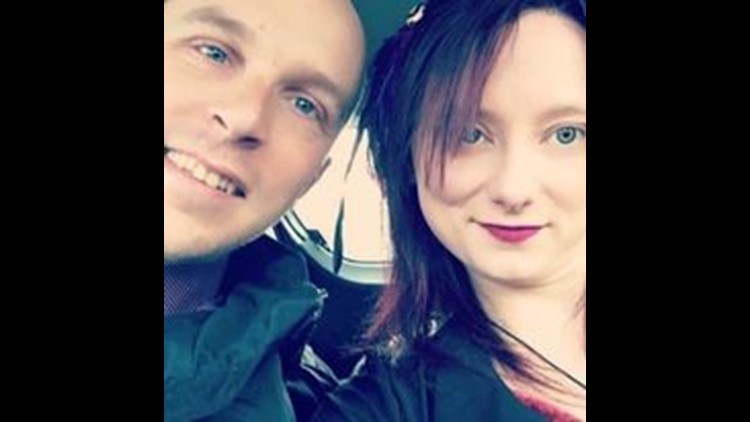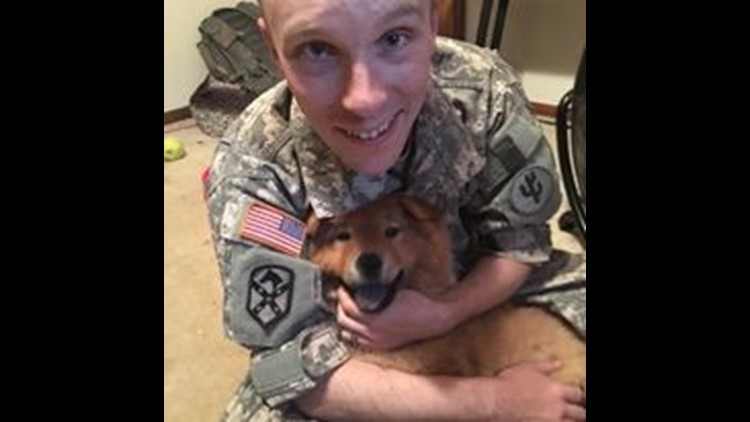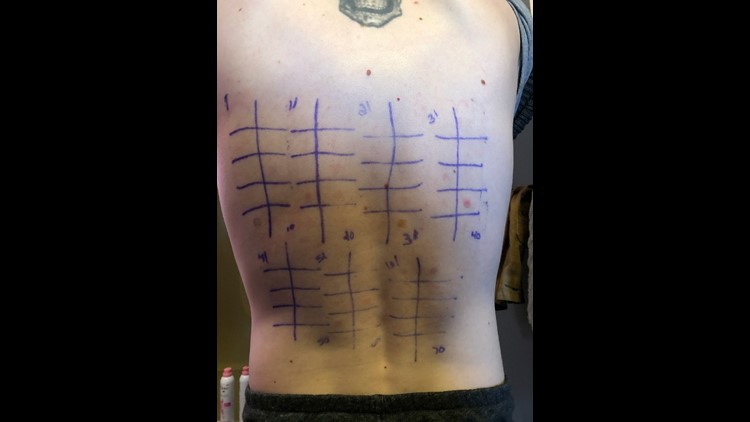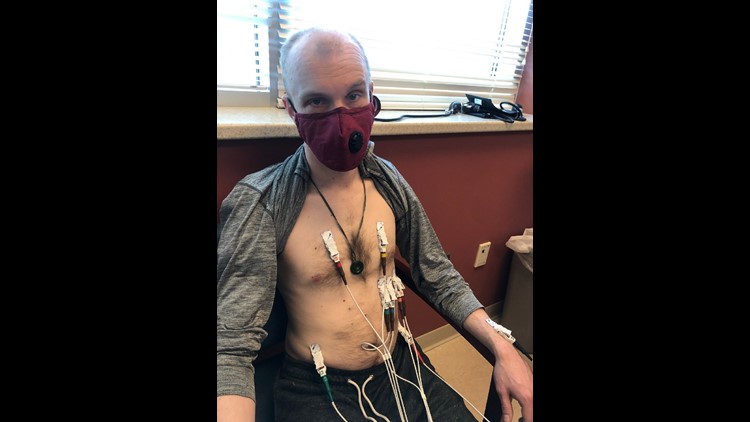GRAND RAPIDS, Mich. — If you go north along Highway 51 out of Memphis, Tennessee for about an hour and a half, you'll find the town of Dyersburg. It's the county seat of Dyer County and sits along the Forked Deer River. It's Small Town USA. What many call - either proudly or sarcastically - 'fly over country.' Only about 17-thousand people. It's nickname is the "Gateway to Everywhere."
JARED: "Where I was born, raised, grew up. Went through school found out there's really not much jobs."
When Jared Enochs graduated high school in 2007, the Great Recession was still about six months away. But, he says the economy still wasn't great in Dyersburg.
JARED: "I mean, there was not much out there was all farmlands. So I mean, you could get into what you get. I went through lawncare, I went through mining company, I went through fast food. I went through and I was stubborn. I was like I have to make sure I've tried everything and make sure that these careers are not something I want to do before I opted in for the army."
Eventually, Jared joined the Army Reserves. He wanted to do something in mechanics or electronics. Like a lot plans people make, they didn't work out like Jared planned them. But, he served his four years. He was deployed to Iraq. He did his service. When he came home from overseas, he weighed 185 pounds. During this interview, he was down to 113.
JARED: "I have been pretty much be imprisoned in the house since last June."
Jared says he's suffering from an array of medial issues. Most all of which he says were caused during his deployment by a very specific thing. But, like countless others... he can't get the United States Government to acknowledge it.
JARED: "And it's hard to prove with all the chemical exposures. Because like I said, No doctor wants to diagnose it. They'll diagnose the issues, but they won't connect the issue to that."
Millions of US service members were exposed to burn pits in the late 2000s and early 2010s. The problems they've caused are varied, debilitating and - in many cases - deadly. President Biden blames burn pit exposure for the cancer that killed his son, Beau. Because of the way the current system is set up, vets have a hard time getting treatment... and an even harder time getting that treatment covered. Many - like Jared - are left fighting the VA, fighting private doctors, and suffering without clear diagnoses.
In today's episode, Jared shares his experiences working and living around burn pits. He details how his life has changed, and the struggles he's facing. We'll also talk to a United States congressman about the effort in Washington to help these service members.
I'm Nick LaFave. This is Alone At The Desk.
Alone At The Desk. A podcast by an average, middle aged guy who just happens to be a TV news anchor. We talk exciting and the boring parts of life, the industry, and life in the industry. And we cover some important stories along the way. Brought to you by 13 On Your Side News in Grand Rapids, Michigan.
A little more than two years after Jared signed up, he got his deployment letter on December 2nd, 2009. A few months later, he was at Joint Base Balad in Iraq.
JARED: "And I was it was 298 support maintenance company was the company I got attached to. And then we were there originally under the 69th Regiment, which then transferred to the one a third ESC, which is the higher echelon and we we were kind of like the maintenance slash repair company that came in."
Jared says his was a maintenance-slash-repair company. But, they were getting tasked out for other things, too - like KP. And maintaining burn pits. Large fires of varying size - oftentimes huge - to dispose of all kinds of garbage and waste.
NICK: "Describe a typical burn pit. What goes in it? How big are they? The smell, everything."
JARED: "We had everything from plastics, metals, fecal matter, like they took all the porta johns, all of that get drained out and that got dumped into the fires for burning. There was exotic metals from from cadmium... woods, tires, everything. You could smell everything from plastic to almost chemical smells."
And he says there wasn't a single day he was there when there wasn't a cloud a mile high over the base.
JARED: "And the entire time I was there, and it just drifted up over the base.. So you could see it waffling off our base, you could see the trail would go for a couple miles across. I mean, it was going all over the parts of us outside of the bases as well."
NICK: "Were you ever dispatched to work on the burn pit directly?"
JARED: "Yeah I did, did a good one, two weeks. We all had small rotations and in more or less was going by platoon. and then whoever was more or less on task that day, they would say, Alright, well, it's your turn to go rotate in for that."
Jared says there wasn't much in the way of protection either. A few people were given N95 masks. That's it.
JARED: "And you only got it if you were the one driving into the pit with the truck. If you're standing next to it, because they had areas where you can just throw stuff off the side into the larger stuff without having to get in the vehicles for the heavy dumps. Those you just pretty much didn't get anything. It was like, just go over the edge."
This went on, Jared says, for the better part of his 15 month deployment. But, at the time... he thought, 'no big deal.'
JARED: "I was in Tennessee, my grandpa had a burn pit in his backyard where he burned a small trash. I never thought more than that of it."
It wasn't until Jared very last day in country, that he started to realize something may have been amiss. They gave him a letter describing the pits and what was being burned in them. What he'd been exposed to on a daily, near constant basis. He read part of the letter to me with his wife, Jennifer.
JARED: "The smoke hazards are associated with burning plastic Styrofoam, paper wood rubber PLL products. I'm not sure what that is. non medical waste, some metals, some chemicals, paint, solvents, etc. incomplete combustion by product lists possibly contaminates includes cyanide."
JENNIFER: "Let me see there's an arsenic in here. benzene, carbon dioxide, carbon monoxide, formaldehyde, hydrogen cyanide."
Despite everything Jared was learning about the contents of those pits, the part that possibly shocked him the most was the date on the letter. December 20th, 2006. It was now 2011, and he was being handed a five year old letter warning him about what he'd just been breathing in for his entire stay at Joint Base Balad.
JARED: "We were sitting in the airport. I remember I had all my gear on I had my rucksack and I had my other rucksack and I had like, everything. I was just sitting and reading it like, it's pretty much saying he's been poisoned. It was like, do you guys realize what this letter says? Like, oh, yeah, it just says they're burning shit all the time. I was like, No, but you see, like, what they've been burning."

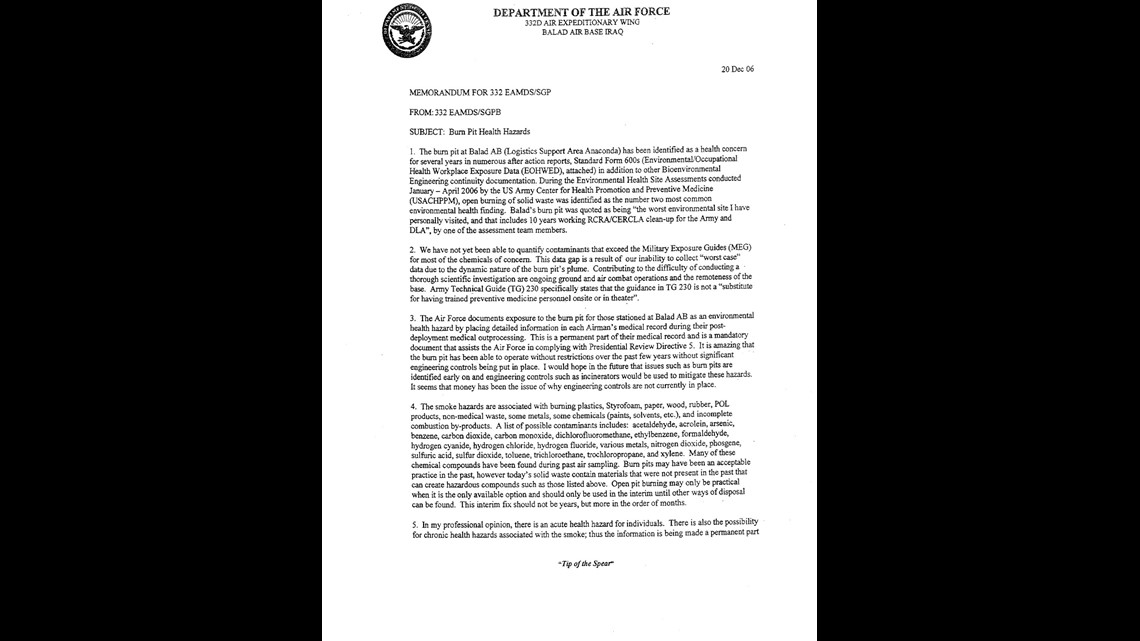

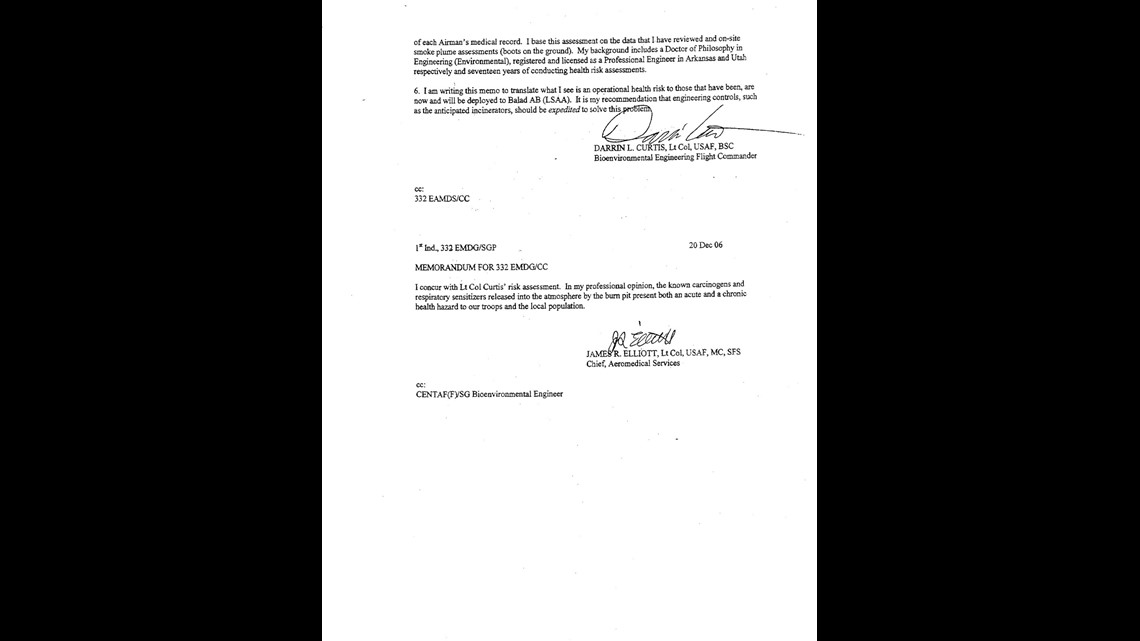
Jared came home. He and Jennifer settled in Michigan. But, more and more health issues starting cropping up.
JARED: "I first started I have is having weird, almost dull sharp pains on the upper GI area and the left side of my abdomen. So I went to the VA was like, Hey, I don't know what's going on here. But this is pain. It's not right. They sent me through the ultrasound. Then I had a CT scan. I didn't see anything. They're like, well, you're good. It's nothing there. Okay, well then got in touch with their specialist for the GI had colonoscopy done. endoscope done. Then MRI done. And I I spent three years fighting with the VA in Ann Arbor trying to figure out what's going on before the GI specialist just told me it's all in my head. I went to a private doctor, in 2014 and that's when I started noticing actual diagnosis is from stuff and I was like wait, is that they did a breath test on me where I had to... little breath into a bag after drinking solution. And it turned out I had some H pylori, which is a very parasitic bacteria that sits in your gut. And then I don't necessarily think the GI issues were related, because over the last 10 years, it's progressively gotten worse, like that pain comes back goes, it shifts over to the right side that goes up. And now I've had sensations where my right kidney feels like it's sweating. Like I feel, okay, there's condensation on the inside of my ribcage. It's the strangest feeling I've had. My gallbladder stopped working. I went through five hospitals to figure out that."
NICK: "The things you're describing to me now do you so Shoot them with the burn pits?"
JARED: "Yea, because I thought they were from the parasite but everything's come back and it's after the parasites was gone. I started noticing my right leg started getting weaker, almost almost like leg drop, and then eventually it just now it's like I had some compartmental trapping of the calf muscle from the knee down to the right foot, or I can't pick up my foot and then having a forced walk with a cane because that in the back injury, it's on the right side. So that whole leg is just painful to stand on. There not just that I have a burning sensation that goes from the neck down to the elbows. It's like burning needle stabbing almost. That's excruciating Lee painful. I just had it the neurologist finally was going through I think the rheumatologist diagnosed me with fibromyalgia. I have pots, which is..."
JENNIFER: "It's a condition where you stand up too quick and your heart's like, noooo."
JARED: "The heart doesn't react fast enough. So I have to take everything slow. I've got caxias. So it's a wasting syndrome. I got vitamin D deficiency."
Jared Enochs
About the only thing Jared has going for him health-wise is that he hasn't developed any respiratory issues, like so many vets have. He says his problems are all neurological. His bigger problem is getting a doctor to conclusively say the burn pits caused the symptoms he's now experiencing.
JARED: "A lot of doctors say it's linked. But they don't want to go through the paperwork and the hassle of saying it's linked, because then they're going to have to fight with the VA."
JENNIFER: "We had a doctor flat out tell us the other day on zoom. He's like, no, this is what it is. I'm not going to diagnose you. I'm like, why?"
And when he goes to the VA, he says they ask for evidence that is basically impossible for him to provide.
JARED: "Because, yeah, they're like, well prove that you were exposed to it. like. Well, here's my letter. Like, well, then prove your conditions are connected to that."
REP. PETER MEIJER (R-MICHIGAN): "I'm not a VA basher. There's a lot of good people who work at the VA. But it's it's a bureaucracy like anything else."
This is United States Congressman from Michigan Peter Meijer, who also served in Iraq.


MEIJER: "My belief is you have to make it harder for a bureaucracy to deny you what you want them to, you know, permit and lay out the burden is on the veteran seeking the VA to to allow rather than putting the burden on the VA to reject that claim."
Meijer - a Republican - is co-sponsor of a bi-partisan bill with fellow Michigan Congressperson, Democrat Hillary Slotkin.
MEIJER: "The goal is to get to the point where there is the presumption that one of those respiratory ailments... if you are at a location with a burn pit, that presumption of service connection, right, putting the onus on the VA and the DOD, rather than making it an almost impossible task for the veteran to do."
Currently, there is a registry where veterans who believe they have symptoms related to burn pits can go and sign up. An estimated 3.5 million service members were exposed. But, to actually get the government to certify their claim is complicated. First they have to register. Then the veteran has to know what was in the burn pit. Then they have to establish those toxins are causing your current health problems.
MEIJER: "And that's before you get to the point of being able to confirm and validate that that ailment is a service connected injury. That's one of the reasons why rejection rates, you know, have been have been, you know, 75 80% on a lot of these claims. It's not because they don't have merit, it's because the threshold the VA is applying is so high that it that unless you have all your paperwork perfect, unless you're able to document to a degree that is frankly impossible, the majority of situations, that claim is going to get rejected. What we want to do is change that presumption, that burden from being on the veteran to say, 'Oh, yeah, that burn pit. Let me go back and like take a sample and say what was burned down or what toxins. I've had been exposed to.' Let's say, listen, all of these ailments that we know are connected to, you know, inhalation of X, Y& Z toxin that's generally understood to have been in those burn pits... remove that hurdle from that veteran."
Meijer, Slotkin and dozens of other lawmakers aren't alone in the fight. Comedian John Stewart - who once crusaded for better benefits for 9-11 responders - is now advocating for veterans with burn pit exposure.
JON STEWART: "They don't need another study to determine whether or not it might not be that healthy to burn everything in sight 24 hours a day, seven days a week next to where you're sleeping. We know it because you're not allowed to do it in the United States of America."
But, like many things, it comes down to money. Meijer knows that.
NICK: "Do you know what the cost will be? And how are you going to reconcile it? And to try and get, you know, hardline deficit hawks on board?"
MEIJER: "I think that's that's part of the ongoing process right now, is that scoring, is that negotiation? You know, I would, my hope is that this gets put into a broader effort, right, because the goal is that ultimately, while this may cost more to the VA, the quicker we're able to, to identify, to diagnose and to start folks on treatment. Frankly, the more lives will be saved, the more quality years of life will be retained for the men and women who have served our country and thinking about it in purely, you know, financial terms. That is, that is a lower investment, to get that early identification, right, because right now, the policy is kick the can down the road, you know, pretend that this isn't an issue, or grudgingly acknowledge it, but try to wash your hands of responsibility and liability of it. And that only does a disservice to the men and women who have served our country overseas and war zones. But it also is going to have ultimately a much more negative impact on on human lives, and quality life years that also cost our government more in the long term."
Meijer is optimistic that his bill - and/or several other similar ones - will get passed in a matter of weeks instead of months, which will streamline the process for veterans who need the help. Help that's desperately needed for vets like Jared, who's now filed for disability... doesn't know when he'll get back to work... and still doesn't have any acknowledged cause of his problems.
JARED: "I was physically fit. It's like maybe one day a week I actually have the energy to be able to do something like in the house. Like I've I've even had limited ability to my help around the house, which I feel bad."
NICK: "What, what is the VA saying at this point?"
JENNIFER: "We'll see you in six, eight months."
JARED: "Yeah."
This has been Alone At The Desk with Nick LaFave. My thanks to Jared and Jennifer Enochs for sharing their story, and to Representative Peter Meijer. If you'd like to hear more of our episodes, just go to 13OnYourSide.com/podcasts. You can also find us on iTunes, SoundCloud and Spotify. And you can find me at Twitter.com/nicklafave or Facebook.com/nicknews. And you can email me directly at NickLaFave@13OnYourSide.com. Thanks for listening.


